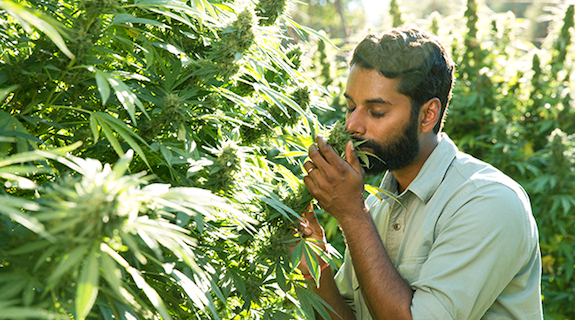In the premiere episode of Weediquette, a new program dedicated to exploring various aspects of marijuana culture on Vice Media’s new cable channel Viceland, host Krishna Andavolu takes a dose of industrial strength cannabis, allowing his hosting duties to slip into confusion, imprecision, and giggles.
Watching Andavolu, it’s hard to imagine he could exist in the same genre as Paula Deen or Martha Stewart, but in many ways, his take on marijuana demonstrates how Vice Media is rethinking traditional lifestyle programming. In a cultural context where millennials are more interested in a great story than a great recipe, the recent launch of Viceland signals how programmers can rethink what lifestyle content means to their audiences.
RELATED:
How Viceland is Leading Digital Media’s March to TV
How Viceland is Reinventing the TV Ad Model for Millennials
Viceland exemplifies how to transform a fairly broad and well-known consumer insight— millennials are more focused on experiences than ownership—and translate it into an aspirational consumer identity that underpins all its lifestyle content. By creating this common spirit across its programming, branding, and sponsorship, Viceland provides a replicable model of how networks can revitalize the role of lifestyle programming for millennial audiences.
Lifestyle content — which traditionally explores areas such as cooking, style, travel, and home décor — speaks to audiences at the intersection of viewer and consumer identity. Lifestyle television programming falls into two major categories: the instructional and the aspirational, both of which pose specific problems for millennial audiences.
For digitally-savvy millennials, instructional content — think cooking or home décor shows with explicit ”how-to” takeaways — feels unnecessary when YouTube can provide direction much more conveniently. Moreover, aspirational programming — shows that give a glimpse of homes, restaurants, vacations, and other markers of status —presupposes an audience that aspires to ownership, a barrier for many millennials. Because of these barriers, there has been major whitespace for networks looking to reimagine lifestyle content for these audiences.
With spending and consumption so inherent to lifestyle content, Viceland’s success in targeting millennials is rooted in its translation of a millennial consumer identity into a programming and branding ethos. Viceland especially understands the ultimate value of experiences as social currency for millennials, and that a great story might be worth much more than a new purchase.
The most explicitly lifestyle-oriented show on the network, F*ck That’s Delicious starring Queens-based rapper Action Bronson, is much less about identifying the finest restaurants in the world than embracing the joy of randomly stumbling upon a meal and the willingness to try the unknown (often while less-than-sober).
While the network’s programming is still rooted in the same types of consumer experiences of traditional lifestyle content—particularly food and travel—Viceland frames consumption as a journey, not a final destination. If traditional lifestyle is about how to get things—a newly decorated house, a meal, or sense of style—Viceland’s millennial brand of lifestyle content is all about how to get great story.
Key to celebrating this spirit of randomness and discovery is the way Viceland presents its hosts. While established lifestyle hosts such as Anthony Bourdain also relish the random and unexpected, their presence on screen is ultimately one of authority that provides a sense of instruction and structure.
In contrast, while confident and generally competent, Viceland’s hosts regularly embrace that they’re in over their head, fallible, and open to discovery. One only needs to see Weediquette’s Andavolu stumbling high through the forest to realize that Viceland’s personalities are much more interested in embodying a general spirit of adventure and openness than providing straightforward instruction.
In addition to the spirit of its programming, Viceland’s brand integration and sponsorship further speaks to this millennial consumer attitude. The network’s most visible sponsor, MailChimp (also well known via its sponsorship of the Sarah Koenig’s podcast Serial), has created interstitial content that mirrors the network’s ethos. Rather than centering on MailChimp itself, the spot focuses on the service’s role for local small businesses.
MailChimp’s first spot explores Heatonist, a Williamsburg-based hot sauce seller that exemplifies the exact kind of unique, local discovery that culturally resonates with millennials. By using large brands’ interstitial content to focus on small, local, and often quirky brands, Viceland and its sponsors directly speak to the millennial consumerist worldview that also informs its programming. By streamlining both its content and its ad strategy, Viceland has proven to be a major pioneer in millennial lifestyle programming.
Viceland is not about the millennial rejection of consumer identity, but the understanding that this consumer identity has strikingly different cultural expectations than those that came before it. While traditional lifestyle programming has aired towards instruction or guided aspiration, Viceland has demonstrated that millennial audiences have fundamentally different expectations of what this content should provide. As its programming and branded content demonstrate, Viceland uses its understanding of millennial consumption to shift the nature of the lifestyle genre, a valuable model for programmers looking to innovate in this space.

Rajiv Menon is a cultural analyst at TruthCo., an omnicultural branding and insights company that analyzes the current cultural landscape to deliver actionable recommendations that keep entertainment brands and their offerings relevant. Connect with TruthCo. at www.truthco.net or on Twitter @TeamTruthCo.
Tags:













































__twocolumncontent.jpg)











